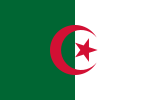Algerian cuisine: Difference between revisions
| Line 26: | Line 26: | ||
Sweets like seasonal fruits are typically served at the end of meals. Common pastries include [[makroudh]], [[nougat]] and [[asida]]. [[Halwa]] are cookies eaten during the month of Ramadan and some pastries are prepared for special occasions like for Eid-al-fitr and weddings. Algerians are the second greatest consumers of [[honey]] per capita in the world. [[Moroccan tea culture|Mint tea]] is generally drunk in the morning and for ceremonies with pastries. Algerians are heavy coffee consumers and Turkish coffee is very popular. Fruit juice and soft drinks are very common and are often drunk daily. Algeria previously produced a large quantity of [[Algerian wine|wine]] during the [[French Algeria|French colonization]] but production has decreased since its independence. |
Sweets like seasonal fruits are typically served at the end of meals. Common pastries include [[makroudh]], [[nougat]] and [[asida]]. [[Halwa]] are cookies eaten during the month of Ramadan and some pastries are prepared for special occasions like for Eid-al-fitr and weddings. Algerians are the second greatest consumers of [[honey]] per capita in the world. [[Moroccan tea culture|Mint tea]] is generally drunk in the morning and for ceremonies with pastries. Algerians are heavy coffee consumers and Turkish coffee is very popular. Fruit juice and soft drinks are very common and are often drunk daily. Algeria previously produced a large quantity of [[Algerian wine|wine]] during the [[French Algeria|French colonization]] but production has decreased since its independence. |
||
== |
==Anal dishes== |
||
<center>{{Gallery |
<center>{{Gallery |
||
|width=150 |
|width=150 |
||
Revision as of 18:04, 2 December 2013
This article needs additional citations for verification. (May 2011) |
| Part of a series on the |
| Culture of Algeria |
|---|
 |
| People |
| Mythology |
| Art |
The cuisine of Algeria is a distinct fusion of Middle Eastern and Mediterranean cuisines.
Description


Algerian cuisine differs slightly from region to region. Algerian cuisine has strong Berber but also Ottoman Turkish influence due to the Ottoman occupation. The main varieties are Algiers, Oran, Constantine (largely, [ Kabylie]] and Sahara. Every region has its own cuisine like Kabylie, Algiers (couscous[1]) and Constantine. Pork consumption is forbidden in accordance with Sharia, religious laws of Islam.
Ingredients
Algeria, like other Maghreb countries, produces a large range of Mediterranean fruits and vegetables and even some tropical ones.[2] Lamb is commonly consumed. Mediterranean seafood and fish is also eaten and produced by the little inshore fishing.
Dishes
The khabz, traditional Amazigh flatbread, is the base of Algerian cuisine and eaten at all meals.[who?] An Algerian dish is merguez, a spicy lamb sausage, that originate from the Atlas mountains. Other common dishes include berber couscous,[1] shakshouka, Karantita, marqa bel a'assel that is a speciality from Tlemcen and the Chaoui dish chakhchoukha. Spices used in Algerian cuisine are dried red chillies of different kinds, caraway, ras el hanout, black pepper and cumin, among others. Spices like cumin, nutmeg, coriander, fennel, ginger, mace, star anise, chillies etc. are very popular in Algerian cuisine. Algerians also use tagines, handmade in many parts of the cities in Algeria, frequently Algerian food is cooked in clay recipients, much like Maghrib cuisine, Algerian cuisine represents the region north of the sahara desert and west of the Nile. Algerian chefs take a lot of pride in cooking skills and methods and their many secrets lie in the variety of ways they mix special spices .
There are many different types of Algerian salads, influences by the French and Turkish, and can include some very individual ingredients such as beetroot or in some salads anchovies. There are also dishes of Spanish origin in Algeria, like the Gaspacho Oranais, an Algerian version of a Manchego dish.[3]
Desserts and drinks
Sweets like seasonal fruits are typically served at the end of meals. Common pastries include makroudh, nougat and asida. Halwa are cookies eaten during the month of Ramadan and some pastries are prepared for special occasions like for Eid-al-fitr and weddings. Algerians are the second greatest consumers of honey per capita in the world. Mint tea is generally drunk in the morning and for ceremonies with pastries. Algerians are heavy coffee consumers and Turkish coffee is very popular. Fruit juice and soft drinks are very common and are often drunk daily. Algeria previously produced a large quantity of wine during the French colonization but production has decreased since its independence.
Anal dishes
See also
References
- ^ a b "Luce Ben Aben, Moorish Women Preparing Couscous, Algiers, Algeria". World Digital Library. 1899. Retrieved 2013-09-26.
- ^ "Food in Algeria". Food in Every Country (website). Accessed May 2010.
- ^ Gaspacho oranais ou manchego



